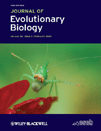-
Views
-
Cite
Cite
S. Alizon, A. Hurford, N. Mideo, M. Van Baalen, Virulence evolution and the trade‐off hypothesis: history, current state of affairs and the future, Journal of Evolutionary Biology, Volume 22, Issue 2, 1 February 2009, Pages 245–259, https://doi.org/10.1111/j.1420-9101.2008.01658.x
Close - Share Icon Share
Abstract
It has been more than two decades since the formulation of the so‐called ‘trade‐off’ hypothesis as an alternative to the then commonly accepted idea that parasites should always evolve towards avirulence (the ‘avirulence hypothesis’). The trade‐off hypothesis states that virulence is an unavoidable consequence of parasite transmission; however, since the 1990s, this hypothesis has been increasingly challenged. We discuss the history of the study of virulence evolution and the development of theories towards the trade‐off hypothesis in order to illustrate the context of the debate. We investigate the arguments raised against the trade‐off hypothesis and argue that trade‐offs exist, but may not be of the simple form that is usually assumed, involving other mechanisms (and life‐history traits) than those originally considered. Many processes such as pathogen adaptation to within‐host competition, interactions with the immune system and shifting transmission routes, will all be interrelated making sweeping evolutionary predictions harder to obtain. We argue that this is the heart of the current debate in the field and while species‐specific models may be better predictive tools, the trade‐off hypothesis and its basic extensions are necessary to assess the qualitative impacts of virulence management strategies.





